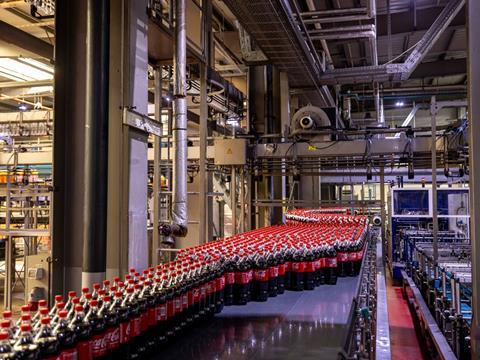
Coca-Cola HBC has opened a new in-house production facility in Romania to supply rPET for its 100% recycled bottle portfolio – apparently positioning the company to deliver almost 50% rPET use across its EU and Swiss markets by the end of the year.
The development follows an investment of €11 million, which includes €3.5 million of state aid, and is thought to make Romania the first market within the group to use 100% recycled bottles across its portfolio, an in-house PET production facility – and, from December, a deposit return scheme (DRS) to facilitate bottle and can collection for recycling.
Other ventures into DRS are set to roll out in many of the company’s markets, with five currently active across the company’s markets and six more set to be added by the end of 2025. These systems are said to reach a typical collection rate of 90% for bottles and cans.
Coca-Cola HBC Romania is also described as the first beverage producer in the market to produce PET in-house and, of Coca-Cola HBC’s markets, marks the third rPET decontamination facility to begin operations.
It is reported that 22% of the PET used across Coca-Cola HBC’s EU and Swiss markets in 2022 was recycled. A combination of its progress in Romania and the transition into recycled bottle portfolios in its Swiss, Austrian, Italian, Irish, and Northern Irish markets, the company claims that it is on its was to utilizing 50% rPET by the end of 2023, ahead of its 2025 deadline.
With packaging constituting around a third of Coca-Cola HBC’s carbon footprint, the company is foregrounding its efforts to achieve net zero emissions across its whole value chain by 2040. Food-grade rPET bottles have an 80% lower carbon footprint than virgin PET resin, the company claims, and all electricity used on its production line is said to come from 100% renewable sources.
Additionally, it claims to have reduced 30% of emissions across its entire supply chain since 2010 and invested €377 million into its sustainability initiatives.
“I’m very proud of the progress we are seeing in our sustainability agenda and our mission to create a world without waste,” said CEO Zoran Bogdanovic. “At Coca-Cola HBC, our purpose is to ‘Open Up Moments that Refresh us All’ and this means that, beyond the functional refreshment that we provide, we strive to refresh our communities and the environment through the work that we do.
“We are working to produce and deliver our drinks in more sustainable ways and in packaging that has a life beyond its initial use – and Romania is a great example of how we can work collaboratively with our stakeholders and the wider industry to create a circular economy for packaging.”
Coca-Cola Philippines recently rolled out its own line of 100% rPET bottles – including caps and labels – for its Coca-Cola Original and Wilkins Pure brands. A new sustainable packaging platform is accompanying their release, seeking to increase consumer education in the fight against plastic waste.
In another development, Indorama Ventures claims to have recycled 100 billion post-consumer PET bottles since February 2011, diverted 2.1 million tons of waste from the environment, and saved 2.9 million tons of carbon footprint from product life cycles.
If you liked this article, you might also enjoy:
The L’Oréal approach to packaging sustainability
What steps is Apple taking to make its packaging more sustainable?
How did Brazil achieve its 100% aluminium can recycling rate – and can it be replicated in the EU?
Experts have their say on the EU’s Packaging and Packaging Waste Directive revisions
Also, if you’re interested in packaging sustainability, you will want to attend our Sustainable Packaging Summit in Amsterdam on 14-15 November. The Summit brings together leaders and pioneers from across the industry to align strategically, learn, network, and create a critical mass to accelerate change. You can learn more by clicking here, and you can buy a ticket to attend here.













No comments yet